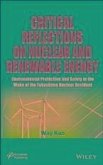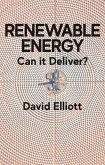Dieser Download kann aus rechtlichen Gründen nur mit Rechnungsadresse in A, B, BG, CY, CZ, D, DK, EW, E, FIN, F, GR, HR, H, IRL, I, LT, L, LR, M, NL, PL, P, R, S, SLO, SK ausgeliefert werden.
Hinweis: Dieser Artikel kann nur an eine deutsche Lieferadresse ausgeliefert werden.
It provides an excellent treatment of wholesale energy markets both in the US and abroad, together with fundamentals of regulatory policy, including how policy is shaped by various institutions. A technically sound and very readable description of "how does the power system work" initiates new learners, while a treatment of recent changes, including high renewable growth, offers substantive insights for seasoned experts. Advanced energy market concepts related to ancillary services, reliability, investment, and capacity markets are clearly explained.
The book appropriately concludes by defining energy poverty and describing the need for nations worldwide to direct policy formation towards addressing this complex subject. This book is a must-read for all energy sector engineers and policy makers. It is also an exceptionally useful book for university coursework at both the senior undergraduate and graduate levels.
James McCalley
Distinguished Professor
Iowa State University
-------------------------------------------------------------
It is a unique book that holistically brings together the pressing issues in modern electricity systems. The authors begin with fundaments of electrical engineering, economics, and tradeoffs made in real-life planning and operations. The subsequent chapters explain the role of people and institutions, energy poverty, the actual workings of power systems, wholesale, retail, and local energy markets, their relevance now, and their future direction. I especially liked the diversity of global examples in this book. For example, the book discusses Nepali power cuts and their solution in Chapters 3 and 10, highlights the importance of local innovation "City Safari" in Chapter 10, and provides examples/exercise in investment in renewable hydrogen in Chapters 5 and 7. In all, they introduce technical 'Tools' to address opportunities and issues around modern electrical systems.
Their combined international, diverse experience is the secrete sauce for making this book readable and timely. It is a must-read for engineers, policymakers, managers, and other professionals working in the electrical energy sector.
Prof Dr. Bhola Thapa
Vice Chancellor, Kathmandu University, Nepal









